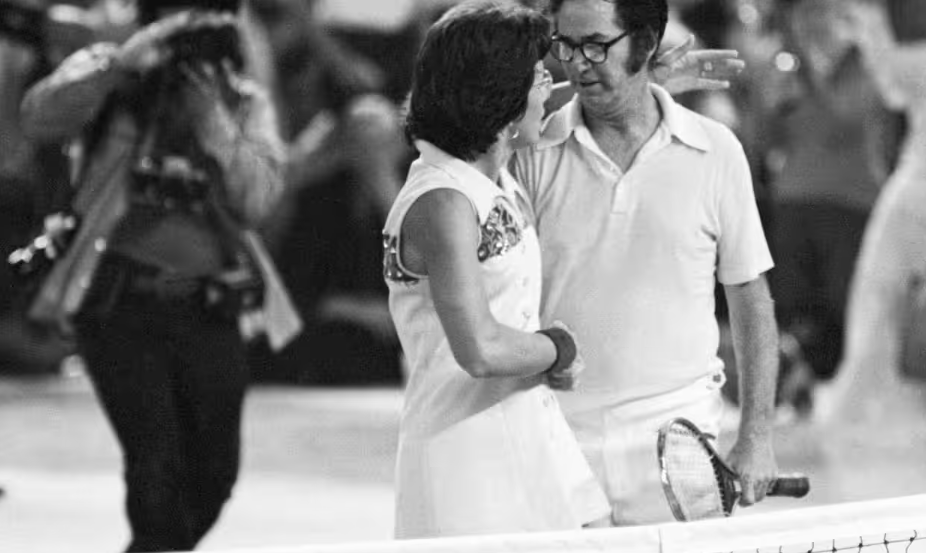After all the bluster, all the promotion, all the anticipation, Bobby Riggs laid an egg. Just as he had humiliated Margaret Court, Billie Jean King made him look like the slow-footed, powerless 55-year-old he truly was.
Until the moment the first ball was struck, most onlookers expected a Riggs victory. The man had beaten Court 6-2, 6-1, and he rarely took a bet he couldn’t win. King’s inner circle was confident, too–husband Larry predicted a straight-set win–but the majority of the 30,000-strong Astrodome crowd was ready to watch as tennis’s most famous women’s libber was put in her place.
The mood didn’t last. Billie Jean took a 40-15 lead in the first game, and back at the Los Angeles Tennis Club, 1959 Wimbledon champion Alex Olmedo proclaimed, “Bobby’s on the defensive. Billie Jean’s going to win!” Both players were nervous in the early going. Riggs broke for a 3-2 advantage, but King broke right back.
Cliff Drysdale, a veteran player watching Riggs for the first time, began to worry he would lose his bet. “He’s got no power! How can he be so mediocre?”
Drysdale’s wife, Jean, was more circumspect. She, like many in the crowd, suspected it was all part of the hustle. Back in his heyday, Riggs would lose a few games–or a set, or even two–so that a collaborator in the crowd could lay more bets at favorable odds. He had complained all week that there was no King money in Houston. Perhaps he was trying to juice his payday.
If that was the plan, it backfired miserably. Billie Jean converted the first set, 6-4, on a Riggs double fault, no less. Just an hour earlier, Bobby had arrived on court in a gold-plated rickshaw. That, wrote Bud Collins, was “his last moment of glory.”
For spectators able to see beyond the carnival, it was a quality match. Once Billie Jean settled in, she fired winner after winner. She took advantage of the fast indoor surface to get to the net, where she found that Riggs couldn’t pass her well enough to halt the attack. Madame Superstar won three straight games to close the second set, 6-3.
By then, it was clear that Bobby’s deficit was no sham. “Riggs was out of shape,” wrote former player Gene Scott. “He was a balloon. Mentally and physically.” King had run him ragged. The Happy Hustler gave ammunition to future conspiracy theorists by turning in a tactical performance as shoddy as his physical one. “He played stupid tennis,” said Marty Riessen, another pro watching in the LA Tennis Club locker room. “He never put the ball down her forehand side.”
Billie Jean kept streaking to take the first two games of the third set. After another stumble, she regained the lead, forcing Riggs to hold serve to stay in the match at 3-5. He almost did. With both players hanging on to their last nerve, they seesawed through five deuces before Bobby double-faulted and netted a backhand to gift his opponent the last two points of the match.
In the Guardian, David Gray called it a “crushing tactical, technical and psychological victory” for King. Jean Drysdale thought that the champion could “do more with the tennis ball than any other woman I’ve seen.” Arthur Ashe said, “She’s too good–she hits the ball like a man.”
Ashe’s clumsy compliment was exactly what Billie Jean was playing for. “I’ve always wanted to equalize things for us,” she said after the match. “I don’t care if this was an exhibition. A lot of non-tennis people saw it and they now know what women can do.”
Riggs, for all his bluster, knew when he was beaten. He managed one final burst of energy to hop the net for the handshake. He didn’t make excuses, though he did want a rematch. He had been so confident of victory he promised to jump off a bridge if he lost. Now he thought about which bridge it would be.
“I guess I’m the biggest bum of all time now,” he said. “She played too well…. Girls her age are tough on 55-year-old guys. I have to eat a lot of crow. I said a lot of things and I have to take them all back.”
For tennis, there was nothing to take back. Madame Superstar’s nerves of steel–and a killer backhand volley–had won another battle for the growing women’s game. Promoters saw limitless potential in the sport, even if the “Battle of the Sexes” concept was largely played out. A half-decade of controversy was forgotten–at least for the moment–in the glow of one bizarre, spectacular evening.
“This has made a lot of dreams come true for me and for tennis,” said Billie Jean King. “This is a delight.”
* * *
This post is part of my series about the 1973 season, Battles, Boycotts, and Breakouts. Keep up with the project by checking the TennisAbstract.com front page, which shows an up-to-date Table of Contents after I post each installment.
You can also subscribe to the blog to receive each new post by email:
